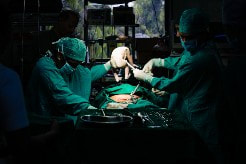 Drop in medically assisted births. Photo by Amit Guar.
Drop in medically assisted births. Photo by Amit Guar. The ‘Parliamentarians for the 2030 Agenda’ see to the implementation of the Sustainable Development Goals, and Belgium’s role therein. During a webinar on September 29th the parliamentarians looked at where we are 5 years into the 2030 Agenda and enquired into the impact of the COVID-19 pandemic on its realisation.
Prof. Dr. Olivier Degomme, Director of the International Centre for Reproductive Health (ICRH-Ghent University) took stock of the consequences of the pandemic on SDG3, ‘good health and well-being for all’. He showed the worldwide measurements have serious consequence for the access to contraceptives, family planning services and maternal health. Recent research of the WHO indicated that 90% of all countries reported interruptions of essential health services, and 68% reported interruptions of family planning services.
Prof. Dr. Olivier Degomme, Director of the International Centre for Reproductive Health (ICRH-Ghent University) took stock of the consequences of the pandemic on SDG3, ‘good health and well-being for all’. He showed the worldwide measurements have serious consequence for the access to contraceptives, family planning services and maternal health. Recent research of the WHO indicated that 90% of all countries reported interruptions of essential health services, and 68% reported interruptions of family planning services.
 Photo by Lucia
Photo by Lucia There were less visits, problem in access to services and stockouts and this was not limited to low- and middle-income countries. In the UK, for example, Marie Stopes International reported that more than 1 in 3 women experienced difficulties accessing contraceptives during lockdown. The diminished access worldwide has led to an increase in unplanned pregnancies, and consequently an increase in abortions, which more often will happen in unsafe conditions due to the limited access to abortion clinics. Pregnant women also saw their access to prenatal care compromised and more women needed to deliver at home, without medical assistance. The lack of access to adequate care and services will lead to an increase of maternal deaths.
Lina Neeb, president of the Advisory Board on Gender and Development (ARGO) explained how governments worldwide failed to take the needed social measurements to protect the hardest hit sectors, which are often the most feminised ones. Different global processes interconnect, with conservative governments taking advantage of the pandemic to undermine multilateralism and human rights agreements and women rights’ organisations are less heard.
In an important year, with the 75th anniversary of the UN General Assembly, the 20th anniversary of Resolution 1325 and 25 years Beijing Platform of Action, we need to continue to encourage policy makers to talk loud and clear about the importance of gender equality and sexual and reproductive health and rights.
Belgium can also do better in terms of building an understanding of the impact of its support for gender equality in developing countries, and in terms of support for women’s rights organisations in partner countries, who will be the ones needed to bring about change, Neeb concluded.
Lina Neeb, president of the Advisory Board on Gender and Development (ARGO) explained how governments worldwide failed to take the needed social measurements to protect the hardest hit sectors, which are often the most feminised ones. Different global processes interconnect, with conservative governments taking advantage of the pandemic to undermine multilateralism and human rights agreements and women rights’ organisations are less heard.
In an important year, with the 75th anniversary of the UN General Assembly, the 20th anniversary of Resolution 1325 and 25 years Beijing Platform of Action, we need to continue to encourage policy makers to talk loud and clear about the importance of gender equality and sexual and reproductive health and rights.
Belgium can also do better in terms of building an understanding of the impact of its support for gender equality in developing countries, and in terms of support for women’s rights organisations in partner countries, who will be the ones needed to bring about change, Neeb concluded.

 RSS Feed
RSS Feed